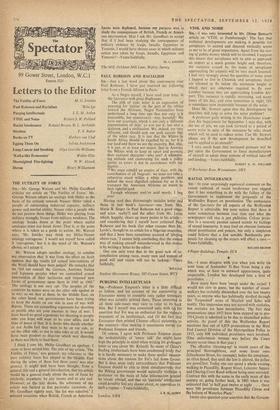Letters to the Editor
The.Futility of Force M. G. lonides Paul Robeson and Racialism 'Bola Ige Purging Intellectuals J. E. M. Arden VTOL and Noise Robert S. W. Pollard Racial Intolerance Roland Brown, R. L. Archdale Strydom F. E. Baker Rooks on TV Herbert van Thal Egging Them On Sylvia Andersson Lung Cancer and Smoking Glyn Greville Williams • Kafka-like Economics' Walter Ellis Shortsighted Fire-lighting N. W. Alcock Devon Henry Williamson
THE FUTILITY OF FORCE
SIR,—Mr. George Watson, and Mr. Philip Goodhart criticise my article on The Futility of Force.' Mr. George Watson adopts an analogy with Hitler as the basis of his attitude towards Nasser: Hitler ruled a people of outstanding industrial capacity, military power and martial ability. Nasser rules a people who do not possess these things. Hitler was playing from military strength; Nasser from military weakness. The analogy breaks down at the point where useful analogies must not break down. That is, at the point where it is taken as a guide to action. Mr. Watson says, `Mr. Ionides may think my Hitler-Nasser analogy outrageous.' I would not myself have called it 'outrageous,' but it is the word of Mr. Watson's choice, so I accept it.
Mr. Watson adopts another analogy, to combat my observation that 'it was from the effect on Arab opinion that the results [of armed interventions of the West] should have been judged.' He remarks that we 'did not consult the German, Austrian, Italian and Japanese peoples when we committed armed intervention of their territories and imposed new forms of government upon them in 1943 to 1945' The analogy is not very apt. The peoples of the countries he names were on the other side against us in war, so we shot at them. In the Middle East, on the other hand, our governments have been trying to keep the Arabs on our side in case of war with Russia. There are compelling arguments for shooting at people who are your enemies in time of war; I have heard no good arguments for shooting at people who you hope will want to be your allies, and in time of peace at that. It is Arabs who decide whether or not Arabs feel they want to be on our side, or on the other side, or not to take sides at all. It would have been prudent to discover which way shooting at them was likely to lead them.
I think I owe Mr. Philip Goodhart an apology. I seem to have misled him. The title of my article, 'The Futility of Force,' was general; my reference to 'the part military force has played in the +Middle East during the crises of these last three years' was also general. It might well have been thought, from a general title and a general introduction, that my article would be a general study about the use of force by anybody, anywhere, by any means and to any end. However, as the text shows, the substance of my article was limited to five particular occasions. As Mr. Goodhart rightly says, 'the list was selective.' I selected occasions when British, French or American forces were deployed, because my purpose was to study the consequences of British, French or Ameri- can intervention. May I ask Mr. Goodhart to accept that if I had been studying the consequences of military violence by Iraqis, Israelis, Egyptians or Yemenis, I would have chosen cases in which military action was taken by Iraqis, Israelis, Egyptians and Yemenis?—Yours faithfully, M. 0. IONIDES


































 Previous page
Previous page